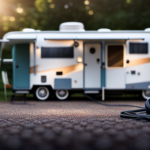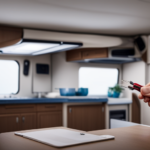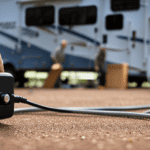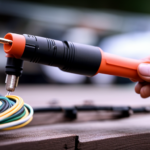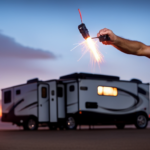During a camping excursion last summer, an unexpected thunderstorm emerged. The downpour and overhead flashes of lightning made me concerned for my camper’s safety. It was at this moment I understood the significance of properly grounding and shielding my camper against electrical surges.
Grounding a camper is crucial for the safety of both the vehicle and its occupants. It ensures that any electrical faults or surges are safely directed into the ground, reducing the risk of fire or electric shock. But where do you start? How do you properly ground a camper?
In this article, I will guide you through the step-by-step process of grounding your camper. From gathering the necessary tools and materials to connecting the grounding wire to the camper’s electrical system, I’ll provide detailed instructions to help you ensure a secure and effective grounding connection.
But it doesn’t stop there. I’ll also share tips on regular inspection and maintenance of the grounding system, and the benefits of using a surge protector. And if you ever find yourself in doubt, I’ll advise you to consult a professional for expert guidance.
So let’s dive in and learn how to ground your camper, ensuring a safe and worry-free camping experience.
Key Takeaways
- Grounding a camper is crucial for safety and prevents electrical faults or surges.
- Proper grounding diverts excess electrical current into the ground, reducing the risk of fire or electric shock.
- Grounding provides stability and balance to the electrical system, preventing power surges and damage to sensitive equipment.
- It reduces the risk of electrical fires by neutralizing potential faults.
Understand the Importance of Grounding
You’ll want to understand the importance of grounding when it comes to setting up your camper. Proper grounding is essential for the safety and functionality of your camper. Without it, you run the risk of electrical malfunctions and potential hazards.
The importance of proper grounding cannot be emphasized enough. It ensures that any excess electrical current is safely diverted into the ground, preventing damage to your camper’s electrical system and appliances. Additionally, grounding helps protect you and your loved ones from the risk of electric shock.
A well-grounded camper offers numerous benefits. Firstly, it provides stability and balance to the electrical system, ensuring that all components are functioning properly. This helps prevent power surges and fluctuations that could damage sensitive equipment, such as your refrigerator or air conditioner.
Secondly, grounding reduces the risk of electrical fires, as any potential electrical faults are immediately neutralized. Lastly, a well-grounded camper allows for efficient and safe operation of electrical appliances, giving you peace of mind during your camping adventures.
Now that you understand the importance of grounding, it’s time to gather the necessary tools and materials for the task at hand.
Gather the Necessary Tools and Materials
Once you’ve got all the required tools and materials ready, it’s amazing how quickly you can transform a simple vehicle into a cozy home away from home. To properly ground a camper, you’ll need a few essential items.
First, gather materials such as a grounding rod, copper wire, wire cutters, and a grounding clamp. These items will ensure a safe and effective grounding setup for your camper.
Next, determine the location where you’ll install the grounding system. Look for a spot near your camper that has good conductivity, such as moist soil or a grassy area. Avoid areas with rocks or concrete, as they may hinder proper grounding. Once you’ve found the ideal location, drive the grounding rod into the ground using a hammer or mallet until it’s secure and stable.
To connect the grounding rod to your camper, use the copper wire and grounding clamp. Cut a length of copper wire that will reach from the grounding rod to the camper. Strip the ends of the wire and attach one end to the grounding rod using the grounding clamp. The other end should be securely connected to a metal part of your camper, such as the chassis.
By gathering the necessary tools and materials and determining a suitable location for grounding, you’ll be one step closer to having a properly grounded camper. Now, let’s move on to the next section and learn how to locate a suitable grounding point.
Locate a Suitable Grounding Point
To find the perfect spot for grounding, simply explore the surrounding area and discover a location with ample conductivity and natural beauty. Choosing the right grounding point is crucial to ensure the safety and stability of your camper. Look for a spot that is close to the electrical source and has good conductivity, such as a metal rod or stake driven into the ground. It’s important to avoid areas with underground pipes or cables to prevent any damage.
To help you visualize the process, here is a table that outlines the key factors to consider when selecting a grounding point for your camper:
| Factor | Consideration |
|---|---|
| Conductivity | Look for areas with moist soil or near a body of water, as they tend to have better electrical conductivity. |
| Distance from Power Source | The closer the grounding point is to the power source, the more effective it will be in dissipating electrical charges. |
| Accessibility | Choose a location that is easily accessible, as you may need to inspect or maintain the grounding connection in the future. |
| Natural Beauty | Consider a spot that offers a pleasant view or is surrounded by nature, as it will enhance your camping experience. |
Ensuring proper grounding techniques is essential for the safety of your camper and its occupants. Once you have chosen the ideal grounding point, you can proceed to the next step of preparing the grounding wire.
Now, let’s move on to preparing the grounding wire and completing the grounding process.
Prepare the Grounding Wire
As you embark on the next step of the grounding process, get your creative juices flowing and prepare the wire that’ll connect your camper to the earth, like a lifeline tethering your mobile sanctuary to the natural world. Understanding grounding techniques is crucial to ensure the safety and functionality of your camper’s electrical system.
Here’s how you can properly install the grounding wire:
-
Choose the right wire: Opt for a copper grounding wire that’s sturdy and durable, ensuring effective conductivity.
-
Measure and cut: Determine the length of wire needed to reach from the grounding point to the camper’s electrical system. Cut the wire accordingly, leaving some extra length for flexibility.
-
Strip the ends: Strip off about an inch of insulation from both ends of the wire using wire strippers, exposing the bare metal.
-
Attach the wire: Connect one end of the wire to the grounding point, such as a metal rod securely driven into the ground. Use a grounding clamp or secure it tightly with a suitable fastener.
-
Route the wire: Safely route the wire along the underside of the camper, away from any moving parts or potential hazards.
With the grounding wire prepared, it’s time to connect it to the camper’s electrical system, ensuring a solid and reliable connection for optimal grounding.
[Connect the grounding wire to the camper’s electrical system.]Connect the Grounding Wire to the Camper’s Electrical System
Now that you have your grounding wire all set, it’s time to make the vital connection to your mobile sanctuary’s electrical system. Ensuring a secure and reliable connection is crucial for the safety and proper functioning of your camper. Let’s explore the connectivity options and grounding safety precautions to follow.
To begin, let’s take a look at the available connectivity options. Most campers have a dedicated grounding point designed specifically for this purpose. It is typically a metal rod or plate that is securely attached to the frame of the camper. This grounding point provides a direct path for any electrical currents to safely dissipate into the ground. Before proceeding, make sure to locate this grounding point on your camper.
To help you better understand the connection process, let’s use a table to illustrate the steps:
| Step | Procedure |
|---|---|
| 1 | Locate the grounding point on your camper’s frame |
| 2 | Strip the end of the grounding wire |
| 3 | Attach the stripped end of the wire to the grounding point |
When connecting the grounding wire, it is essential to take grounding safety precautions. Ensure that the wire is firmly attached and tightly secured to the grounding point. Avoid any sharp bends or kinks in the wire, as this can weaken the connection and compromise its effectiveness.
With the grounding wire successfully connected to the camper’s electrical system, we can now move on to the next step of securely attaching the grounding wire to the grounding point. This ensures a solid and reliable connection, providing peace of mind and ensuring the safety of your camper’s electrical setup.
Securely Attach the Grounding Wire to the Grounding Point
Securing the grounding wire tightly to the dedicated grounding point on your mobile sanctuary’s frame is crucial for maintaining a safe and reliable electrical connection. This ensures that any potential electrical currents can safely dissipate into the ground. For example, imagine a camper owner who neglected to securely attach the grounding wire, resulting in an unstable connection that could lead to electrical malfunctions and potential safety hazards.
To attach the grounding wire, follow these steps:
- Locate the designated grounding point on your camper’s frame. This is typically a metal stud or bolt specifically designed for grounding purposes.
- Strip the end of the grounding wire to expose the bare copper strands.
- Place the stripped end of the wire onto the grounding point, ensuring that it makes direct contact with the metal surface.
- Use a wrench or pliers to tighten the grounding wire securely onto the grounding point. Make sure it’s tightly fastened to prevent any accidental disconnections.
By securely attaching the grounding wire to the grounding point, you’re establishing a reliable electrical connection that prioritizes safety. Once this step is completed, it’s essential to test the grounding connection to ensure its effectiveness and reliability.
Test the Grounding Connection
To ensure the safety and effectiveness of your electrical connection, it’s time to put your grounding connection to the test. Testing the grounding connection is crucial to ensure that your camper is properly grounded and protected from electrical hazards.
To test the grounding connection, you’ll need some essential test equipment and use troubleshooting techniques.
One of the most common and effective ways to test the grounding connection is by using a multimeter. Set the multimeter to the resistance or continuity mode and connect one lead to the grounding wire and the other lead to a known good ground source. The multimeter should display a low resistance or continuity reading, indicating a good grounding connection.
If the multimeter shows a high resistance or no continuity reading, it indicates a problem with the grounding connection. In such cases, you may need to recheck the connection at the grounding point, inspect for any loose or damaged wires, or consult a professional for further troubleshooting.
Regularly inspecting and maintaining the grounding system is essential to ensure its continued effectiveness. By checking the grounding connection periodically and addressing any issues promptly, you can maintain a safe and reliable electrical system in your camper.
Regularly Inspect and Maintain the Grounding System
Make sure to regularly check and maintain the grounding system in order to keep your electrical setup safe and reliable. Inspecting the grounding system is essential to ensure it’s functioning properly.
Here are some techniques to help you inspect your camper’s grounding system:
-
Visual Inspection: Examine the grounding connections for any signs of corrosion or damage. Make sure the connections are tight and secure.
-
Continuity Testing: Use a multimeter to check for continuity between the grounding conductor and the earth. This’ll help verify if the grounding system is intact.
-
Resistance Testing: Measure the resistance between the grounding conductor and the earth. A low resistance indicates a good grounding system.
Maintenance tips for the grounding system:
-
Clean Connections: Regularly clean the grounding connections to prevent corrosion and ensure proper conductivity.
-
Tighten Connections: Periodically check and tighten all grounding connections to maintain a secure and reliable connection.
-
Replace Damaged Parts: If any components of the grounding system are damaged, such as wires or clamps, replace them promptly to maintain the system’s effectiveness.
By regularly inspecting and maintaining your grounding system, you can ensure the safety and reliability of your camper’s electrical setup. As you consider using a surge protector, it’s important to have a well-maintained grounding system as it plays a crucial role in protecting your camper from electrical surges.
Consider Using a Surge Protector
Don’t forget to protect your precious electrical setup by considering the use of a surge protector. It’s like having a superhero shield that defends against electrical surges! Surge protectors offer numerous benefits when it comes to grounding your camper.
First and foremost, they safeguard your electrical system from power surges, which can occur due to lightning strikes or fluctuations in the power grid. By diverting excess voltage away from your camper, surge protectors prevent damage to your appliances, electronics, and wiring.
Moreover, they provide peace of mind, knowing that your equipment is protected even during severe weather conditions.
When it comes to surge protector installation, there are a few tips to keep in mind. Firstly, choose a surge protector with the appropriate voltage rating for your camper. Additionally, consider purchasing a surge protector with built-in diagnostic features, such as LED indicators, that alert you to potential issues.
It’s also important to install the surge protector close to the power source, ideally at the electrical pedestal, to ensure maximum protection.
Remember, while surge protectors are an essential part of grounding your camper, it’s always wise to consult a professional if needed. They can assess your specific situation and provide expert advice on the best surge protector for your camper’s electrical system.
So, let’s delve into the next section and explore the importance of consulting a professional for a safe and effective grounding setup.
Consult a Professional if Needed
If you want a worry-free and effective grounding setup, it’s always a good idea to seek professional advice. Consulting a professional can provide you with the expertise needed to ensure that your camper is properly grounded.
They will have the knowledge and experience to assess your specific situation and recommend the most appropriate grounding solution. When it comes to grounding a camper, there are several factors to consider. A professional can help you understand the electrical requirements of your camper and determine if any modifications are necessary.
They can also advise you on the type of grounding system that will work best for your camper and the specific campground or location where you will be staying.
Here are a few reasons why consulting a professional is important when grounding a camper:
- Expertise: Professionals have in-depth knowledge of electrical systems and can provide expert advice on grounding solutions.
- Safety: Proper grounding is essential for the safety of both you and your camper. A professional can ensure that all safety standards are met.
- Compliance: Consulting a professional will help you ensure that your grounding setup meets all relevant codes and regulations.
By seeking professional expertise, you can have peace of mind knowing that your camper is properly grounded and that you have taken all necessary precautions for a safe and worry-free camping experience.
Frequently Asked Questions
How can I tell if my camper is properly grounded?
To check if my camper is properly grounded, I use a multimeter to measure the electrical connection. I ensure that the ground wire is securely connected to a metal stake in the ground.
One interesting statistic to note is that according to a study by the National Fire Protection Association, improper grounding of campers can increase the risk of electrical fires by 50%. If a camper isn’t properly grounded, it can lead to electric shocks, damage to appliances, and even fires.
Can I use any type of wire for grounding?
Yes, it’s important to use the proper grounding wire for your camper to ensure safety. There are different types of grounding wire options available, such as copper wire or aluminum wire. It’s recommended to use a wire that’s specifically designed for grounding purposes, as it’s made to withstand outdoor conditions and provide a reliable connection. Using the correct wire will help protect against electrical hazards and ensure that your camper is properly grounded.
Is it necessary to ground a camper if I’m only using battery power?
I can understand the temptation to skip grounding when using battery power alone in a camper. However, let me assure you that grounding is still necessary for the longevity of your battery and the safety of your camper.
By having a grounding system in place, you can prevent electrical issues, protect your appliances, and ensure proper battery maintenance. So, even though you may not be connected to a shore power source, grounding is still vital for a smooth and safe camping experience.
What are the potential risks of not grounding a camper?
Not properly grounding a camper can pose potential risks. Without proper grounding, there’s an increased chance of electrical shocks, especially if there’s a fault in the electrical system. This can be dangerous for anyone inside the camper, as well as nearby individuals.
Additionally, not grounding a camper can also increase the risk of electrical fires, as the excess electrical energy has nowhere to go. Therefore, it’s crucial to prioritize the importance of proper grounding to ensure safety while using a camper.
Can I install a grounding system myself or do I need to hire a professional?
Grounding system installation for a camper is a task that can be done by a knowledgeable DIY enthusiast. However, it’s essential to emphasize the importance of a proper camper grounding inspection. Hiring a professional for this task ensures that all necessary grounding for battery power is in place, reducing the risks associated with not grounding a camper. Using suitable wire for grounding is crucial, and the benefits of a grounding system outweigh the cost of professional help.
Conclusion
In conclusion, grounding your camper is essential for safety and proper functioning of the electrical system. By following the steps outlined in this article, you can ensure that your camper is properly grounded and protected from electrical hazards.
Remember to regularly inspect and maintain the grounding system to keep it in top condition. And don’t forget to consider using a surge protector for added protection against power surges.
If you’re not confident in your abilities, don’t hesitate to consult a professional for assistance.
Happy camping!




